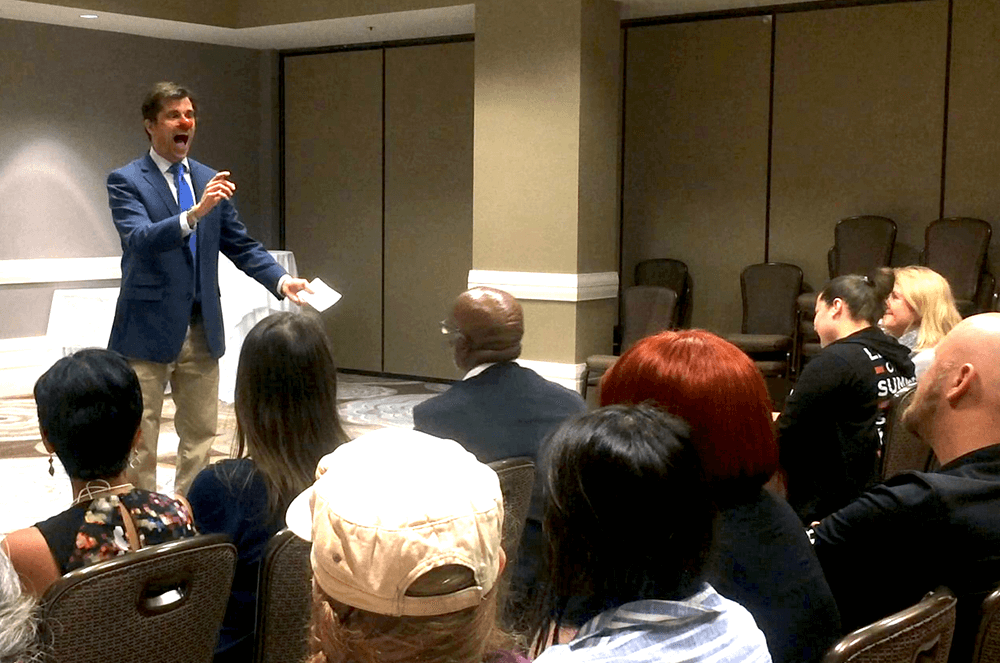
Panic coursed through my body as I stared down from the stage. I was midway through my Toastmasters 2023 International Convention education session, “No Joke: Engaging Your Audience Like a Clown (Not the Creepy Kind).” The audience member in the front row that I had just invited to join me onstage gazed up at me thoroughly confused. He began explaining why he couldn’t … in a language that I did not understand! I chose him because his engaged, positive, and kind demeanor seemed to make him the perfect audience participant, but unfortunately, there was no way to gauge his familiarity with my native tongue. This was an international convention, after all.
I’ve faced more than my share of stage mishaps, but this one was occurring in front of an audience of more than 5,000 in-person and virtual Toastmasters attendees. My mind flashed back to my preparation …
It all started seven months prior when I was overjoyed to receive an invitation to deliver a 45-minute session at the International Convention in The Bahamas. Wow! I thought, What an opportunity! And then, moments later, PANIC! Even though I speak to Fortune 500 companies and have performed internationally as a Blue Man and contemporary circus clown in front of thousands, I still had doubts. What if I’m not “Toastmaster-y” enough? I took a deep breath and began to prepare for my big talk using four elements: community support, productive feedback, video review, and self-care.
Community Support
I immediately reached out to Jennifer Perry-Ruzic, the 2022-2023 District 4 Director, to ask if any local clubs would be interested in hosting my practice sessions, and our District (San Francisco to Los Altos, California) showed up in an incredible way. Clubs that generously allowed me to present included Menlo Park Toastmasters Club, San Mateo Toastmasters Club 191, Evening Stars, SAP Toastmasters, Plane Talk, Daly City Toastmasters, First Republic Toastmasters, and Genentech Toastmasters Club. The members’ crucial feedback completely transformed my presentation.
Your Takeaway
If you have a high-stakes presentation on the horizon, your speech content is of value to fellow Toastmasters, and you can segment your talk to fit into a club agenda, consider reaching out to local clubs for practice opportunities. Our Toastmasters community is an incredible resource. Repetitive practice before a supportive audience diminishes anxiety thanks to the theory of habituation. Habituation theory proposes that after repeated exposures to a stimulus, the response to that stimulus will decrease. In other words, repeated deliveries of your presentation will result in decreased anxiety. Plus, you will build your speaking skills, try out new ideas, and meet new Toastmasters.
Productive Feedback
During one of my practice club presentations, one Toastmaster who proudly called herself “the Shredder” delivered a challenging, no-holds-barred assessment of my talk. I grinned and thanked her for her input, but on the car ride home I came up with a quippy retort in response to every one of her criticisms. However, as her comments percolated over the next couple of days, I realized that every one of her comments was absolutely on target. I gratefully integrated her comments into my presentation. Thank you, “Shredder!”
Your Takeaway
Hearing feedback can be difficult, especially if your content is personal or fresh. However, the detailed and solitary tasks of writing and rehearsing can cause you to lose perspective and forget to focus on your audience’s needs. If feedback overwhelmingly tells you that a beloved element of your speech does not serve the audience, it’s time to let that element go. You can find a helpful grain of truth in nearly all feedback if you can avoid taking it personally.
 Don Colliver speaks to the audience during his education session at the 2023 International Convention.
Don Colliver speaks to the audience during his education session at the 2023 International Convention.Video Review
As I practiced at home, I began to record and observe my rehearsals. Although watching myself was uncomfortable at first, these viewing sessions allowed me to improve my nonverbal communication and refine physical moments in my presentation. For example (spoiler alert), during a humorous moment of my speech, I trigger my pants to drop to reveal silly boxer shorts (it is a clown presentation, after all). In my recordings, I observed that my pants would get caught while dropping, ruining the gag’s timing. To resolve this issue, I added weights to my pockets, ensuring that the pants would fall smoothly and quickly. The pants gag was saved!
Your Takeaway
Observing videos of your presentation can be an efficient route to improvement, but almost no one enjoys watching themselves. You’re not alone! Before you watch yourself, you may find it helpful to pick only one specific element to observe, like eye contact, nonverbals, or pacing. Once you begin watching, there can be a great temptation to simply create a list of all the other areas you can improve, but do your best to resist. Creating a massive list of your faults while you watch yourself is a great way to discourage any further self-observation.
Self-Care
Once I arrived at the Grand Hyatt Baha Mar resort in Nassau, my nerves wouldn’t let me forget that my presentation was coming up. As I waited for my session, I was grateful to be distracted by the many incredible presentations before mine, like Lisa Nichols’ inspirational keynote.
If feedback overwhelmingly tells you that a beloved element of your speech does not serve the audience, it’s time to let that element go.
During the morning of my session, I focused on self-care. At that late hour, I knew that panicked revisions and cramming would do more harm than good. I chose to do a gentle workout, eat a light breakfast, and then take time for quiet meditation.
Your Takeaway
With practice, meditation can allow anxious feelings and sensations to be observed from a detached, curious, and compassionate perspective, allowing them to pass so you can focus on the situation at hand. A 10-minute guided body scan meditation can be an easy intro to this practice. During a guided body scan meditation, a gentle voice guides you to visualize consecutive parts of your body, one at a time, from head to toe, or vice versa. Free meditation apps like calm.com and insighttimer.com have many options to choose from. Over time, this practice can strengthen your ability to observe your anxiety as a detached spectator, a critical shift necessary to improve as a public speaker.
In this Toastmasters Podcast episode, learn how to tap into your clown presence with professional speaker and performer Don Colliver.
Flashback to the Stage
I was back, mid-presentation, staring down at the confused audience member in the front row that I had just invited to the stage. He clearly did not understand my request. So, I had to move on. As my months of preparation flashed through my mind—community support, productive feedback, video review, and self-care—I realized that I had prepared for exactly this moment. With the ease that only comes with practice, I acknowledged and thanked the original audience member, then smoothly gazed down the front row, landing on another kind, supportive face: the face of Jeff Sobel, DTM, Past International Director. I invited Jeff to the stage to a loud round of applause, and our audience participation portion went off without a hitch.
Patient practice brings about more than just a polished speech. Low-stakes practice and lots of self-care prepares you for all the ways your presentation may not go the way you planned. You will get to know your content so well that you will be able to effortlessly adapt to any situation. My Toastmasters 2023 International Convention experience will forever live on as one of my most cherished memories, and I hope the tips I delivered onstage also live on in the speeches of Toastmasters around the world!
Don Colliver is a corporate trainer, trade show presenter, and bestselling author living in the San Francisco Bay Area of California. He teaches teams to communicate more effectively so they can exceed their goals. Reach him at doncolliver.com.



 Previous
Previous

 Previous Article
Previous Article


